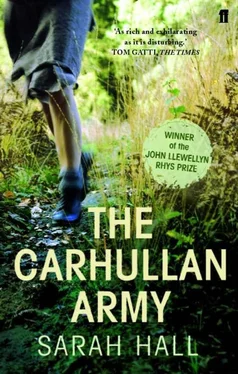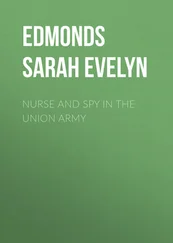Sarah Hall - The Carhullan Army
Здесь есть возможность читать онлайн «Sarah Hall - The Carhullan Army» весь текст электронной книги совершенно бесплатно (целиком полную версию без сокращений). В некоторых случаях можно слушать аудио, скачать через торрент в формате fb2 и присутствует краткое содержание. Год выпуска: 2008, Издательство: Faber and Faber, Жанр: Современная проза, на английском языке. Описание произведения, (предисловие) а так же отзывы посетителей доступны на портале библиотеки ЛибКат.
- Название:The Carhullan Army
- Автор:
- Издательство:Faber and Faber
- Жанр:
- Год:2008
- ISBN:нет данных
- Рейтинг книги:4 / 5. Голосов: 1
-
Избранное:Добавить в избранное
- Отзывы:
-
Ваша оценка:
- 80
- 1
- 2
- 3
- 4
- 5
The Carhullan Army: краткое содержание, описание и аннотация
Предлагаем к чтению аннотацию, описание, краткое содержание или предисловие (зависит от того, что написал сам автор книги «The Carhullan Army»). Если вы не нашли необходимую информацию о книге — напишите в комментариях, мы постараемся отыскать её.
The Carhullan Army — читать онлайн бесплатно полную книгу (весь текст) целиком
Ниже представлен текст книги, разбитый по страницам. Система сохранения места последней прочитанной страницы, позволяет с удобством читать онлайн бесплатно книгу «The Carhullan Army», без необходимости каждый раз заново искать на чём Вы остановились. Поставьте закладку, и сможете в любой момент перейти на страницу, на которой закончили чтение.
Интервал:
Закладка:
The basic chores continued that morning, and in the afternoon the sleeping quarters were rearranged. More of Jackie’s unit were moved into the main house; there were now three women to a room, and the others were divided equally among the dormitories, like sentinels. Pallet beds were fashioned in the stables for the men. There was no heating system in there and no piped water, but they were given extra blankets and told they could wash in the bothy next door. Lorry checked them over individually, found them fit, more or less, though they were emaciated and lacking nutrients. The older man had kidney trouble, and Sonnelle set about making him some fennel tea. The boys had fared better since being excluded from Carhullan. Their mothers had seen to it that they were looked after, often taking them supplies from their own rations.
A sense of urgency came over the farm. People finished their tasks quickly and then returned to the main house, as if there might be some new word given there, a declaration of what to do next, an instruction from Jackie. But she was no longer around. No one saw her for the rest of that day. I wanted to speak to her about joining the unit, but there was no sign of her, and when I asked Megan, she just shrugged.
Shruti barely spoke to me as we cut down the trees and brought in the wood for the stoves. I knew she was upset, and that she thought me naive, too enamoured by Jackie. I tried a couple of times to begin a conversation, but her answers were short and evasive. Too much of the day had been wasted already, she said, and she didn’t want to be messing about with timber in the half-dark. I had become used to the timely and direct way that the women at the farm resolved their problems, so they would not impact and fester. But Shruti was more hurt than I had anticipated.
I knew there was no hope of her joining the unit. Though the girls teased her about her past, she had left violence far behind her and there would be no return to it, not even in the name of Sisterhood, or under the flag of anti-oppression. Instead the axe in her hand gouged down into the willow bark, again and again, without cutting a single straight line. Her breathing was ragged. Not knowing what else to do, I walked over to her and held her in my arms until the tension dissolved, the axe fell from her grip onto the crisp white ground, and I heard her crying softly.
*
That night Jackie returned to the farm and enlisted ten new volunteers for her unit. I was among them. More would follow in the next month, when any hope that she might not be serious about dismantling the farm and going out into the occupied towns was given up. I was surprised to see Lillian standing at the back of the group. I smiled at her and she shrugged. Jackie informed us that we would begin training the next day, and not to worry about the usual work patterns. Our Sisters would cover for us. She needed us for three straight weeks, she said, and then half a day every day until the campaign became active. There was an appalling formality to the language she used, leaving little room for us to speculate about her professionalism, and whether she would actually follow through. But she looked less tense, as if the return to her old occupation relaxed her.
There would be tests for stamina, endurance, physical and mental strength, map reading, and navigation. ‘We’ll start with the basics,’ she said. ‘Don’t worry about the rest yet. You’ll be split into smaller groups for the first few hikes. Then I’m going to expect you to train alone. You’ve seen how things run in the unit. When you’re up to speed you’ll be organised into patrols, like the others. When I’m not around you’re to follow the orders of those on the council. You know who they are.’ She did not thank us for stepping up or commend our example. And she did not single me out again. But there was a sense of pride in the way she looked us over, and that was enough.
For those three weeks we were pushed to our limits. We were woken each day in the black inhospitable dawn by members of the unit shouting at us to get up. We dressed, sleep drugged and assaulted by torchlight, took an early breakfast, and gathered in the courtyard. By then the weather was savage. The rain seemed too cold not to freeze but it remained soluble, fat and icy, soaking us to the skin almost every day as we walked. Jackie had instructed us to wear light-order dress, and any dry shirt or woollen jumper we were caught trying to put on over the layer of cold sweat would be taken from us. It robbed too much vital salt from the body, we were told. Movement would keep us warm.
The wind sheared off the fells around Carhullan. Above us, the sky was charcoal-coloured and disturbed, the clouds swirling in vortexes, ripping along their edges. Each new route saw us travelling further across the hills, from five miles, to ten, to fifteen, and the loads in the bergens that we carried got heavier as more equipment was loaded into them. Always the ridge would come first in the ascent, as if to stoke fire into our thigh muscles, and we would descend it at the end of the hike, shaking with exhaustion, often sliding on our backsides when our legs buckled.
Though I knew it was going to be hard, I was not prepared for the extremity of it all. I had become fitter from working outside with Shruti, Chloe, and the others. But I was still slow, weaker than those who had lived for years in the harsh environment, and mostly I was towards the rear of the group. It was only sheer determination, the desire not to fail, that kept me on my feet. The times I sat down I felt so dizzy that I thought I might pass out, and I imagined I would be found days later by the unit, lying on the Northern tundra, stiffer than rock, my eyes plucked out by the crows. As on the day I had left Rith, I did not look back when we started out. It was better not to see the warm lamps of Carhullan, better not to think of the women on the farm, moving like insects below us in the fields. And Shruti, asleep in her bunk, asleep against her damp pillow, her body pulsing gently as she dreamt.
We were given rations to take with us: dried meat, salt, and water. There was little time to rest and eat, and wherever possible we were supposed to jog the courses. I pushed myself on, and only when I thought my heart would swell too much as it powered the blood through its chambers, that it would rupture against the bone, did I fall back into a walk. There was little talk between the recruits. Space opened between us as we moved, and only when someone sank to their knees and retched, or began to stagger, did a colleague assist. Those in the unit stood over us when we fell or sought temporary shelter in a stony lee. ‘Pick it up, Sister. Up on your feet. Show us who you are.’ Some days, people turned back. I came home late but I never let myself succumb.
My whole life I had loved the upland terrain, deriving simple pleasure from it as a child — the views, the changing colours of the slopes, the brackish rivers — and though for years I had seen it at only a distance, I had often thought of the landscape as I stood beside the conveyor at the factory; it was a place of beauty and escape. Now I stumbled across its gills and over its marshland, bending to meet the wind when it roared against me, and dragging myself up the scars by handfuls of heather and thorn bushes, by any firm hold. And still, I could not say it wasn’t beautiful. Despite its austerity, its vast and cowing expanse, and the agony of its traverse, it seemed more beautiful than ever. When we reached the walls of the farm and Jackie ordered us to turn round and climb the ridge one more time, and with sickening resolution we began back the way we had come, I did not fall to the earth and scream into the coarse brindle of the moor. If the mountains tested my limits, they also gave me satisfaction, they were the measure by which I gauged my resilience.
Читать дальшеИнтервал:
Закладка:
Похожие книги на «The Carhullan Army»
Представляем Вашему вниманию похожие книги на «The Carhullan Army» списком для выбора. Мы отобрали схожую по названию и смыслу литературу в надежде предоставить читателям больше вариантов отыскать новые, интересные, ещё непрочитанные произведения.
Обсуждение, отзывы о книге «The Carhullan Army» и просто собственные мнения читателей. Оставьте ваши комментарии, напишите, что Вы думаете о произведении, его смысле или главных героях. Укажите что конкретно понравилось, а что нет, и почему Вы так считаете.












